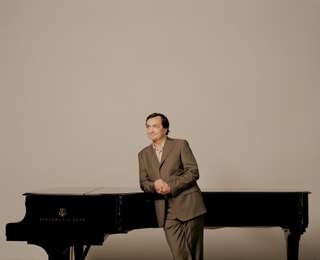|
Back
“Aimard-vous Bach?” New York
Starr Theatre, Alice Tully Hall
08/14/2010 -
Johann Sebastian Bach: Keyboard Concerto in D minor, BWV 1052 – Brandenburg Concerto No. 5 in D major, BWV 1050
Matt Zetterqvist (Violin), Claire Andrada de la Calle (Flute)
Ensemble Basiani, George Donadze (Artistic Director), Chamber Orchestra of Europe, Pierre-Laurent Aimard (Conductor and Pianist)

P.-L. Aimard (© Felix Broede)
Last year, I designated Pierre-Laurent Aimard an enthusiastic missionary for music over four centuries. That was underplaying the reality. For much of the Mostly Mozart festival this year, the happily omnipresent M. Aimard has embraced roles as lecturer, annotator, pianist, conductor, innovator and–as Artist-in-Residence–a chemist who is combining the most heterogeneous artistic materials. Two nights ago, it was music of Bach, Xenakis, Ligeti–and the stunning contrapuntal music of the Republic of Georgia. (Not to be confused with the Political Swamp from the American Republic of Georgia). Tonight, Sunday, he will lead the Chamber Orchestra of Europe in Carter, Boulez and, yes, Bach. Monday, it is the astonishing, Contemporary Music Ensemble playing Bach-but-not-Bach arranged by Berio, Birtwistle, Benjamin etc etc.
Last night, the Georgian choir returned, but more of that later. It began with Mr. Aimard in his element as a pianist in a pair of Bach works. The Concerto was written for the same instrument that rock groups go for: the “Keyboard” (or Klavier). It could have been any innovative instrument vaguley resembling the establishment harpsichord, so Mr. Aimard didn’t have to go back in time to find something “period.” A good modern keyboard with all the dynamics, with Mr. Aimard using the pedal sparingly but with enough to give a resonance unavailable with Bach, made this something of a tour de force.
Yes, it was a hard-driving performance, but Mr. Aimard, who can play the most modern music with dizzying ease didn’t let any of the tempos get away from him. Those short cadenzas seemed to have been improvised at times, with a few extra notes added to the scales, but I’m sure that old J.S. did the same thing. The Chamber Orchestra of Europe, one of M. Aimard’s favorite groups never were left lagging. But one frankly heard little of the orchestra, since this pianist was performing his own miracles.
Two main players of the orchestra starred in the Fifth Brandenburg, and while they may have been overpowered by M. Aimard on keyboard, violinist Matt Zetterqvist and flutist Claire Andrada de la Calle were certainly eloquent enough.
Yet we had here a musical illusion of sorts. At times I felt that those two soloists had lost their way for a measure or two. This was certainly not the literal case. But such was the impetus of M. Aimard’s playing the more mellow tones of the other soloists seemed to be fighting against a massive tide. It did make the Brandenburg more an adventure than mere piece of music.
After the intermission, I thought I could relax and listen with more joy than curiosity to Ensemble Basiani, with its intricate Georgian music. But was I wrong. Works repeated from the preceding night were even more interesting, new pieces were more convolutingly refreshing.
In order, the Shvidkatsayy wedding song had yodels, falsettos, trills along with the rest of the choir in a dazzling display. A love song was like a Debussy nocturne in subtlety.
It was impossible for us pacifists not to love the words of the third song, encapsulating the hypocrisy of war-makers through history: “Peace to us and victory always.” The dissonances of the choir could have been 21st century. A work dedicated to Saint Nino was like a modern Anglican hymn. The repeat of Khasanbergura, about a Georgian apostate was even more involving than the night before. Three of the singers stood apart, improvising on the rest of the choir, like a vocal concerto grosso.
I could go on and on. Unlike the first night, the group did an encore for an audience which rightly didn’t want them to leave. At the end, I was wondering if any Georgian composer could possibly capture orchestrally what this group did vocally. If not, then the Basiani must come back again and again to New York.
Harry Rolnick
|